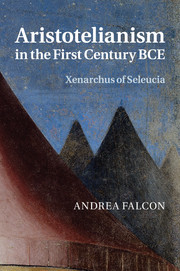Description
Aristotelianism in the First Century BCE
Xenarchus of Seleucia
Author: Falcon Andrea
A full study of the surviving evidence for Xenarchus of Seleucia, one of the earliest interpreters of Aristotle.
Language: English
Subject for Aristotelianism in the First Century BCE:
Approximative price 31.58 €
In Print (Delivery period: 14 days).
Add to cart
Aristotelianism in the First Century BCE
Publication date: 09-2016
Support: Print on demand
Publication date: 09-2016
Support: Print on demand
Approximative price 71.14 €
In Print (Delivery period: 14 days).
Add to cart
Aristotelianism in the first century bce: xenarchus of seleucia
Publication date: 12-2011
240 p. · 15.9x23.5 cm · Hardback
Publication date: 12-2011
240 p. · 15.9x23.5 cm · Hardback
Description
/li>Contents
/li>Biography
/li>
This book is a full study of the remaining evidence for Xenarchus of Seleucia, one of the earliest interpreters of Aristotle. Andrea Falcon places the evidence in its context, the revival of interest in Aristotle's philosophy that took place in the first century BCE. Xenarchus is often presented as a rebel, challenging Aristotle and the Aristotelian tradition. Falcon argues that there is more to Xenarchus and his philosophical activity than an opposition to Aristotle; he was a creative philosopher, and his views are best understood as an attempt to revise and update Aristotle's philosophy. By looking at how Xenarchus negotiated different aspects of Aristotle's philosophy, this book highlights elements of rupture as well as strands of continuity within the Aristotelian tradition.
Introduction; 1. Xenarchus: the man, his work, and his influence in antiquity; 2. Texts, translations, and notes; Conclusion; Appendix. Vestiges of Xenarchus in the Middle Ages.
Andrea Falcon is Associate Professor of Philosophy at Concordia University, Montréal. He is the author of Aristotle and the Science of Nature: Unity without Uniformity (Cambridge, 2005) and Corpi e Movimenti: Il De Caelo di Aristotele e la sua Traditione nel Mondo Antico (2001).
© 2024 LAVOISIER S.A.S.




